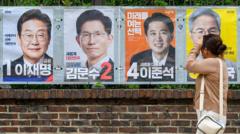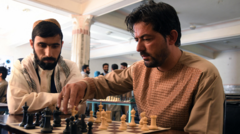Amidst significant political maneuvering in South Korea's upcoming election, young women who once led the protests against former President Yoon Suk Yeol feel their priorities are overlooked, as candidates steer away from addressing crucial gender issues to avoid alienating male voters.
Women's Voices Drowned Out in South Korea's Election Anticipation

Women's Voices Drowned Out in South Korea's Election Anticipation
As South Korea gears up for a pivotal election, women's concerns about gender discrimination remain sidelined by political candidates focused on male voter priorities.
As South Korea approaches its June 3 election to replace former President Yoon Suk Yeol, a growing frustration among young women signals a troubling pattern in political discourse. These women, who played a pivotal role in protests against Yoon during his controversial term, have witnessed their pressing concerns marginalized as candidates focus on appealing to male voters.
The protests, which erupted following Yoon's imposition of martial law last December, showcased a vibrant coalition of young women. They utilized cultural symbols like K-pop and glow sticks, making their voices heard against a backdrop of significant gender-based discrimination that continues to plague the nation. Low wages, underrepresentation in leadership roles, and the pervasive threat of online harassment remain critical issues, yet the political spotlight has largely shifted away from these matters.
The candidates gearing up for the election seem to be navigating a politically sensitive landscape. With economic strains and high youth unemployment driving some young men to perceive their circumstances as a form of "reverse discrimination," any mention of feminist policies is viewed with skepticism. This sentiment was crucial for Yoon's success in the 2022 election, where he dismissed claims of systemic sexism.
While Lee Jae-myung, Yoon's rival from the Democratic Party, leads in current polls, he is also treading carefully. Acknowledging the significance of women in the protests helped him gain traction, but he remains wary of alienating male voters, seeking a delicate balance in his campaign rhetoric.
As the vote draws near, it appears the distinct perspectives of young women—who prioritize safety and equitable representation—are at risk of being overshadowed by broader electoral strategies, leaving vital gender issues unaddressed yet again.




















